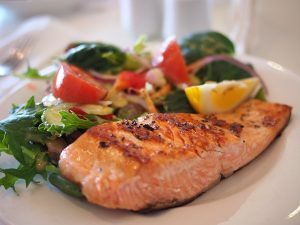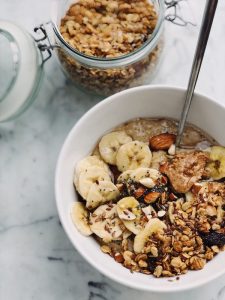Our 7 top tips for reducing inflammation
What do I need to know about an anti-inflammatory diet?
Inflammation has been a hot topic lately, with a lot of circulating information about anti-inflammatory diets, foods and supplements. And for good reason – research has now shown that certain foods and eating patterns can reduce the occurrence, symptoms and severity of inflammatory conditions. In particular, an anti-inflammatory diet can supplement the effects of physical therapy and medication for managing arthritis, and has been shown to reduce symptoms of pain, joint stiffness, swelling and tenderness.
Still wondering what the term “inflammation” actually refers to? You’re not alone. As a recent buzz word, many are yet to learn that inflammation refers to the body’s protective response to illness or injury. Inflammation can be either acute or chronic. Acute inflammation is the body’s immediate response to short term illness or infection, such as swelling when you stub your toe. On the other hand, certain conditions can cause a prolonged inflammatory response that we refer to as “chronic” inflammation. These conditions include arthritis, coeliac disease, asthma and inflammatory bowel disease. Inflammation can also occur after we exercise as our body adjusts to increased stress and loading. Lastly, many people don’t realise that conditions such as obesity, heart disease and diabetes are in fact “inflammatory” (a.k.a. inflammation producing) conditions.
Inflammation and diet
Whilst certain superfoods and supplements often steal the limelight as “anti inflammatory foods”, the most effective way to manage inflammation through our diet is to consume a wide variety of healthy, anti-inflammatory foods. Foods that reduce inflammation include fruits, vegetables, wholegrains, legumes, oily fish, nuts and seeds. These food groups are commonly associated with a Mediterranean diet pattern, which explains why a Mediterranean diet has been proven to lower levels of inflammatory markers and reduce symptoms of arthritis and generalised joint pains. You’ll also notice that that an anti-inflammatory diet is consistent with general healthy eating recommendations.
In terms of anti-inflammatory foods, variety is key, as each anti-inflammatory food functions differently. Different foods contain unique compounds (including types of antioxidants, polyphenols and fibre) which target different inflammatory processes. Because of this, no single food or nutrient will “cure” inflammation. Likewise, we also know that certain foods can contribute towards inflammation and should be avoided, including junk foods, alcohol and processed meats.
7 top tips for reducing chronic inflammation

1. Eat five servings of different coloured vegetables daily
The benefits of our “2&5” are extremely underrated. Vegetables contain many important vitamins, antioxidants and phenolic compounds that help reduce inflammation in the body. Aim to incorporate a variety of different colours, as different pigments provide different nutrients, which each possess different anti-inflammatory properties.
2. Experiment with recipes containing legumes and beans
The resistant starch in legumes and beans is a type of fibre that helps to fuel the bacteria in our gut. Throughout it’s fermentation process, resistant starch helps to reduce inflammation in the gut and throughout the body.
3. Cook with extra-virgin olive oil
Olive oil contains an antioxidant called oleocanthal which produces similar benefits to the anti-inflammatory drug ibuprofen.
 4. Consume oily fish 2-3 times per week
4. Consume oily fish 2-3 times per week
Oily fish such as tuna and salmon contain omega-3, which metabolises into anti-inflammatory compounds called resolvins and protectins. Nuts, chia seeds and flax seeds are also sources of omega-3 that can help to reduce inflammation.
5. Flavour foods with spices such as turmeric, cinnamon and ginger
Spices, especially turmeric, contain chemicals that block inflammatory pathways throughout the body. Plus, they taste delicious and are a fantastic alternative to flavouring foods with salt.

6. Enjoy nuts/seeds as snacks, through salads or as breakfast-toppers
Nuts contain many anti-inflammatory compounds such as omega-3, magnesium, l-arginine and vitamin E. But remember, nuts are easy to over-portion and can contribute to weight gain when consumed in excess. The recommended serving size of nuts and seeds is 30g, or a small handful.
7. Replace refined carbohydrates for wholegrains, and limit fast foods, fatty meats and sugary drinks
Not only will this help to maintain a healthy weight and happy gut, but will prevent the production of inflammation.
Feel like you’re running in circles trying to eat healthy, manage your nutrition and meet your health and fitness goals? Personalised dietary advice is more effective than “dieting” when it comes to losing weight, and keeping it off. Our Accredited Practising Dietitian, Regina Tilyard, will work alongside your needs and preferences to create a nutrition plan that will deliver results.
This post was written by Regina Tilyard. Regina is an accredited practicing dietitian and longstanding member of the Stafford Physio team. Contact us to book an appointment with Regina.

